How Riverboat Gambling Became Riverboat Gaming
Kevin has been involved in the gambling industry since the ‘80s. From winning tournaments to casino management, he’s ultimately done it all. Throughout the years, he’s written for various iGaming publications on topics such as the legal landscape of online casinos and strategies behind winning. His favorite game is blackjack.
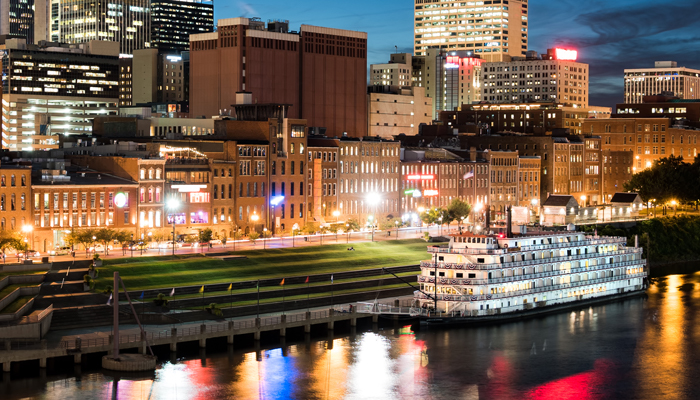
Cash-strapped states across the South and Midwest in the late eighties and early nineties were desperate for a new source of cash revenue that didn’t raise taxes. Gambling seemed like an easy way out, but it was going to be a hard sell to dubious voters.
But what if they used the allure of the old riverboat gambling myths and the promise of using the riverboat casinos to keep the gambling scourge at arm’s length from impacted communities? Could they sell this new, sanitized riverboat gaming to their constituents?

The Evolution of Gaming on America’s Rivers
We will explore the history of riverboat gaming in America from the early 19th century right into the 21st. We will discuss how it morphed and was delicately managed to become a product that a broad number of people could support a few decades ago, before starting another slow decline, and we take a closer look at some of its few bright remaining stars.
- ⛴ The History of Riverboat Gambling
- ⛴ The Beginnings of Riverboat Gaming
- ⛴ A Few of the Best Riverboat Casinos Remaining
- ⛴ Conclusion
The History of Riverboat Gambling
The first steamboat to make the trip down the Ohio and then the Mississippi was aptly named New Orleans, and she made her inaugural trip in 1811. For the next 100 years, these boats would define commerce along the nation’s mighty rivers. And with commerce comes con men.
The huge sums of money that came from moving much of the fledgling nation’s goods up and down the rivers would prove to be a powerful temptation. While much of the gambling that soon developed on these long, slow trips along the river was legal, many of the men who came to play were on the wrong side of the law .
Not even two decades into the new steamboat trade and there were articles in the Eastern papers about the con men, card sharps, and confidence scams being run on every bumpkin that set foot on a boat. In 1835, the townsfolk in Vicksburg had had enough; they lynched 5 of the “professional gamblers” and burned every Faro table in town, which was stated to be in the dozens.
Much like the frontiersman who preceded them and the Wild West lawmen who would come later, these sharply dressed, supremely confident riverboat gamblers who plied their way on the steamboats of the Mississippi using only their luck and some “skills” they’d picked up along the way were the subject of many salacious headlines and stories in their day. Despite their many obvious flaws, an almost reverence was bestowed on them as archetypical American heroes.
The Beginnings Of Riverboat Gaming
The hay day of the Riverboat gambler started to fade in the 1860s during the Civil War, and then with the advent of railroads, they were soon all but forgotten. But in the early 1990s, states desperate for tax revenue and looking at the success of Las Vegas and Atlantic City decided to retest the waters of riverboat gambling.
This time, it was a way of introducing limited casino operations only along the waterways of the State’s rivers, selling it to their constituents as a diversion and pastime. Thus, the term riverboat gaming was needed . This was to be entertainment and frivolity, none of those card sharps and hustlers from the good ole days. So, a new term was coined.
Iowa led the riverboat race with the Diamond Lady in Bettendorf in April 1991. But riverboat gaming would soon come to Illinois, Mississippi, Missouri, Louisiana , and other states along the Mississippi and other large rivers like the Missouri and Ohio and even the Fox and Red Rivers.
Used mainly as a stalking horse for the eventual opening of land-based casinos in most of these states, many gamblers found the cramped quarters, the limited selection of slots and tables, and most egregious of all, the ability to only embark or disembark while the boat was at the pier, to be a let down from the Las Vegas style experience that they had been promised.
In Iowa, the first land-based casinos made an appearance in just three years. In every State, some accommodations were made , from no longer having to cruise the dangerous rivers to being allowed to move on to barges over the river to being able to move to land as long as you were adjacent to the river. This was a push generally called dock-side gaming, which meant that the actual return of elegant paddle wheelers with blackjack, roulette, and slot machines prowling the Mississippi again lasted less than a decade.
Dock-side gaming was far safer and allowed gamblers to come and go as they pleased , which drove casino revenues much higher. Also, the ability in some states to move either onto barges or land-based casinos adjacent to piers saw some spectacular casinos get built that could finally meet the promise of a Las Vegas experience.
A Few Of The Best Riverboat Casinos Remaining
If you are going to visit one of the grand old ladies of the river, we think that you should start with the actual riverboats that once traveled the Mississippi, and of these, the Amelia Belle is one of the most iconic .
Situated about an hour and a half outside New Orleans, deep in Cajun Country, this beautiful riverboat gambling hall has over 30,000 square feet of gaming space , 800 slots, and a dozen table games. Before she was damaged during Hurricane Katrina, she sailed up the river from the port of New Orleans several times a day in the mid-90s, but she now sits permanently in Bayou Bouef, her expedition days behind her.
Since Louisiana has kept its premise of at least gambling on a boat, even if its moored in a giant pool or cemented to the dock, longer than most other of the original riverboat casino states, it’s no wonder we can find most of the truly breathtaking and best riverboat casinos there.
Another of the must-see gambling boats sits on the Red River in Shreveport, Louisiana. Chosen for its 20-minute proximity to the Texas border and only two and a half hours drive from Dallas, Shreveport was once a thriving riverboat gambling town and one of the country’s premier riverboat casino locations. But the Indian tribes in Oklahoma, which sit only an hour outside of Dallas to the North, have taken some of their business.
Still, there are several other riverboats operating in Shreveport, but what we think makes the Sam’s Town Property, one of the best riverboat casinos in Louisiana , is that they’ve turned a 30,000-square-foot gaming boat into a destination resort. They have a 500+ room hotel directly adjacent and tied into the property with four restaurants including a really nice steak house and lots of other amenities. The boat itself has over 1000 slots and more than 27 table games.
One of the best riverboat casinos outside of Louisiana is the Grand Victoria in Elgin, Illinois. Built back in 1995, she was spared the dangers of cruising the Fox River in 1999, when Illinois was one of the last states to end their riverboat gaming rules that required the boats to leave their docks. Today, this 30,000-foot boat has room for 1100 slots and almost 30 tables and even sports an onboard buffet and three other restaurants. She is one of the prettier examples of the early 1990s boats that you will see as well, and it is well worth your time to get a good vantage point and take in her lines.
While both the age of riverboat gamblers and its more recent short-lived renaissance of riverboat gaming are now a thing of the past, the allure of cruising the mighty Mississippi while making your living playing cards and shooting dice will probably live on into the distant future. There is something about the water flowing past and the land slipping by out the window that just seems to call for a quick hand of poker or a spin on the roulette wheel.
It’s a call back to a time when the men and women who traveled these waterways were used to risking everything in order to follow their dreams. Get out there and check out some of those boats, wander the decks, play a hand or two of blackjack, and contemplate that river streaming by while you still have a chance to see a dying American breed , the last of the riverboat casinos.

- Terms & Conditions
- Golden Nugget
- Online Slots
- Online Baccarat
- Online Blackjack
- Online Roulette
- Casino Guides
- Destinations
The Legacy and Historical Influence of Riverboat Casinos in the United States

Welcome aboard as we set sail into the captivating world of riverboat casinos in the United States . On this page, we’ll walk you through their legal status and historical implications, explore the where, what, and why of these floating gaming venues, and finally, take a close look at the modern condition of riverboat gambling.
As we explore the ins and outs of this unique chapter in American gaming history, we’ll also take a glance at if riverboat casinos have left a mark on the WV online gambling scene and gambling in the US in general.
- Legal Status of Riverboat Gambling
- Boat Casinos Regulation in Various States
- History of Riverboat Gambling
- Popular Riverboat Casinos
The Legal Status of Riverboat Gambling
Historically, casino boats were allowed in many states, mostly those with access to the Mississippi River. Today, only six states still allow this form of gambling:
Mississippi
Gambling boats are essentially floating casinos operating on designated waterways . They offer a wide variety of gambling activities just like land-based casinos, including slots , table games , and poker .
Each state with legal riverboat gambling has its own regulatory body responsible for licensing and ensuring compliance with state laws and regulations. These regulations typically address aspects such as gambling activities allowed, revenue sharing with the state, security measures, responsible gambling practices, and environmental considerations.
While sharing similarities with land-based casinos, riverboat casinos face additional regulations due to their unique setting, such as:
- Licensing requirements . Land-based casinos typically have more stringent licensing requirements than riverboat casinos. For instance, land-based casinos may be required to undergo a more rigorous background check and financial audit process compared to riverboat casinos;
- Location restrictions . There are usually fewer restrictions on riverboat casino locations than on those of the brick-and-mortar venues. For instance, land-based casinos might not be allowed to operate in certain areas, such as residential neighborhoods or near schools. Riverboat casinos, in turn, are more flexible when it comes to location, as they can be moored on rivers that flow through various areas;
- Taxation . The taxation of land-based casinos and riverboat casinos can vary depending on the state. In some cases, land-based casinos may be subject to higher tax rates than riverboat casinos;
- Building codes . Land-based casinos are typically required to meet more stringent building codes than riverboat casinos. This is because land-based casinos are permanent structures, while riverboat casinos are considered temporary structures;
- Inspection and enforcement . Land-based casinos usually undergo more frequent inspections and stricter enforcement of regulations compared to riverboat casinos.
Generally, the regulation of land-based casinos tends to be more strict and comprehensive than the regulation of any casino on the Mississippi River . The reason is likely that land-based casinos are considered to have a greater impact on the surrounding community , both in terms of economic benefits and social costs.
State-by-State Riverboat Gambling Regulations
As of 2024, it’s legal to run and visit a riverboat casino in six states. Let’s take a closer look at each of them:
Here, riverboat casinos are allowed on the Mississippi River , the Illinois River , and the Des Plaines River . The casinos must be located at least 300 feet from the shore and be accessible to the public by land or water . Riverboat casinos in Illinois are regulated by the Illinois Gaming Board .
In Indiana, boat casinos can operate on the Ohio River , the Indiana Harbor , and the Patoka Lake Reservoir . They must be located at least 600 feet from the shore . Riverboat casinos in Indiana are regulated by the Indiana Gaming Commission .
In this state, it’s legal for riverboat casinos to operate on the Mississippi River and the Missouri River . They must be located at least 300 feet from the shore and are regulated by the Iowa Racing and Gaming Commission .
A riverboat casino in Louisiana is allowed to operate on the Mississippi River , the Red River , and the Gulf of Mexico as long as they are located at least 300 feet from the shore . The casinos here are regulated by the Louisiana Gaming Control Board .
Obviously, a riverboat casino in Mississippi can be located on the Mississippi River at least 300 feet from the shore . Boat casinos in Mississippi are regulated by the Mississippi Gaming Commission .
Last but not least, Missouri riverboat casinos are allowed on the Mississippi River and the Missouri River at least 300 feet from the shore . Riverboat casinos in Missouri are regulated by the Missouri Gaming Commission .
Brief History of Riverboat Casinos
Explore the history of riverboat casinos in the United States, tracing their origins, development, and impact on both the gambling industry and American culture.
19th Century: The Origins of Riverboat Gambling
The roots of riverboat gambling can be traced back to the 19th century when steamboats were the primary mode of transportation along the Mississippi River. As passengers went on long journeys, gambling became a popular pastime to pass the time. While gambling activities were generally illegal on land at that time, boats provided a loophole, as they were considered to be outside of state jurisdiction.
Early 20th Century: Decline and Revival
The invention of railroads in the early 20th century led to a logical decline in riverboat travel, and respectively, riverboat gambling. However, the 1970s saw a reappearance of interest in riverboat casinos, primarily because of the push to revitalize urban areas.
1990s: Expansion and Legalization
The 1990s marked a period of significant growth for riverboat casinos. Several states legalized riverboat gambling, and the industry expanded rapidly. By the late 1990s, there were over 150 riverboat casinos operating in the United States.
2005: Hurricane Katrina and Its Devastating Blow
In August 2005, Hurricane Katrina struck the Gulf Coast, causing widespread destruction and displacement. The storm severely impacted the boat casino industry in Mississippi and Louisiana, with several casinos suffering significant damage or complete destruction.
Late 2010s: Post-Katrina Recovery and Adaptation
The consequences of Hurricane Katrina brought significant changes to the riverboat casino industry. While some casinos managed to rebuild and reopen, others had to close permanently. The industry also faced increased competition from brick-and-mortar casinos, which were gaining popularity at that time.
Today: A Mature Industry
Today, a casino boat remains a popular form of entertainment in the United States. However, the industry has matured and consolidated, with the number of riverboat casinos decreasing in recent years. Despite these changes, riverboat casinos continue to be an important economic driver in many regions.
Popular Riverboat Casinos in the US
Now that we know all the theory about riverboat gambling, let’s get to practice and take a look at the most popular water casinos in the United States.
The Grand Victoria Casino – Elgin, Illinois
Located along the beautiful Fox River, The Grand Victoria Casino is a home (or rather a boat) of true gaming elegance. Known as the largest riverboat casino in Illinois, it boasts an impressive 65,000 square feet of gaming space including slots, table games, and a poker room. The casino also offers a variety of dining and entertainment options, including a steakhouse, a buffet, and a concert venue.
Ameristar Casino Vicksburg – Vicksburg, Mississippi
The Ameristar Casino Vicksburg is one of the oldest and most crowded riverboat casinos in Mississippi with over 50,000 square feet of gaming space . The wide choice of slots, table games, and poker tables is complemented by all kinds of entertainments, from the flavors of a diverse buffet to comedy clubs and nightclubs.
Horseshoe Casino – Bossier City, Louisiana
The Horseshoe Casino is one of the largest riverboat casinos in Louisiana and one of the most popular. It features over 100,000 square feet of gaming space , including slots, table games, and a poker room. The casino also offers a variety of dining and entertainment options, so players can choose between a steakhouse, a buffet, a concert venue, and others.
Sam’s Town Casino – Shreveport, Louisiana
Sam’s Town Casino is a popular destination for all kinds of gaming enthusiasts in and out of state. With a gaming space of over 34,000 square feet , this casino offers an intimate yet exhilarating experience. Beyond the slots, table games, and poker room, Sam’s Town welcomes gamers to savor a culinary journey with a steakhouse, a buffet, and a unique entertainment experience at the in-house bowling alley.
What is the Diamond Lady casino boat?
The Diamond Lady Riverboat Casino was a paddlewheel riverboat casino that operated on the Mississippi River in Bettendorf, Iowa, from 1991 to 2008. In 2021, the Diamond Lady sank during a severe winter storm. It was later raised and brought to shore, where it remains today. The future of the Diamond Lady is uncertain, but it is possible that it will be restored and reopened as a casino or museum.
Why do casinos have to be on water in the US?
Casinos in the US don’t necessarily have to be on the water, but there are some casinos that are. This practice originated when gambling laws were more restrictive on land, and the association of riverboat gambling with waterborne transportation became a legal requirement in some states.
Why are casinos on the water so popular?
Riverboat casinos are popular for their unique charm and historical allure. The on-water setting offers players a distinctive and memorable gaming experience, contributing to the popularity of these establishments. Additionally, the regulations associated with riverboat gambling create a controlled and regulated environment that appeals to both operators and players.
Most Recent

Join our subscription list to get access to new bonus offers, online casino reviews, and industry news all in one newsletter!
- CRUISE TIPS
- Carnival Cruise Line
- Celebrity Cruise Line
- Disney Cruise Line
- Holland America Line
- MSC Cruises
- Norwegian Cruise Line
- Princess Cruises
- Royal Caribbean
- Virgin Voyages
- Windstar Cruises
- Travel Deals
- CRUISE SHIP TRACKER
- Port Webcams

There are various areas of the world that just seem synonymous with gambling. When people hear the name Las Vegas they picture gambling of a flashy, mass entertainment proportion. Macau ’ s gambling culture brings a real Asian flavour to gambling, with many inevitably comparing it to Vegas. Monte Carlo delivers gambling connotations of wealth and prestige. Obviously, it is not just physical areas where gambling has a strong presence, with the web and mobile space being dominated by PartyCasino and other big names in the industry.
Another, yet somewhat less spectacular, sight that can only be associated with gambling is the steam propelled riverboat of certain states in the USA. How did these iconic vessels come to be known for hosting casinos, and what is the current status of riverboat casinos today?
On Water, But Not Land
There is a network of rivers that penetrate inland from the Gulf of Mexico up through the United States, most famously the Mississippi River . In the 19 th Century the rivers provided a fantastic way to transport goods from town to town up and down the bodies of water. This in turn became a popular method of passenger transport, with travellers using the boat to socialise. One of the most popular forms of entertainment was play at online Irish casino , and therefore this pastime became highly popular aboard the vessels.
There were also, and still are today, laws that prohibited gambling on land. However, the proprietor s of these boats took advantage of the loophole not extending these laws to establishments on water. Even today, riverboats are still to be found on the Mississippi and is still considered one of the best for cruises. Certain rivers acted as state lines, so it was sometimes argued that the gamblers could not be classified as being in one state or another while steaming down a river.
Railroads and War
As mentioned, the riverboats were first and foremost a means of transportation and enjoyed such success due to it being the quickest and most reliable means of travel and delivery of goods. However, when railroads started to spread across the country, they opened up new routes that got people around in a more direct manner. The trains also cut days off travel and therefore started to overtake the riverboats in popularity.
Around the same time the American Civil War broke out, a period where much of the fighting was done in the Southern States which defied the laws laid out by the North. This meant that riverboat entertainment almost came to a complete end.
The Riverboats of Today

Unlike the boats of old, which used to set off on long journeys to various destinations, the vessels of now mostly remain docked and very seldom actually take to the open waters. However, one will still be able to undergo the traditional experience that thousands enjoyed before casinos became what we are familiar with today.

- #RiverCruise

Related Articles
5 trending watersports all cruise enthusiasts should try, oceania cruises includes gratuities for all guests, viking announces expansion of china offering with new voyages starting in 2025, get the cruise addicts newsletter free.
Stay in the loop with the latest cruise news, tips, and reviews directly to your inbox.
Latest Articles
Seabourn unveils incredible entertainment lineup and conversations speakers for 2024 grand africa voyage, explora journeys appoints anna nash as president.
© Copyright 2024 - Cruise Addicts
- Affiliate Disclaimer
- Privacy Policy

Legends of America
Traveling through american history, destinations & legends since 2003., george devol – old west card sharp.
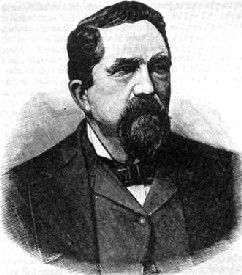
George Devol
“I don’t know just how thick my old skull is, but I do know that it is pretty thick, or it would have been cracked many years ago, for I have been struck some terrible blows on my head with iron dray-pins, pokers, clubs, stone-coal, and bowlders, which would have split any man’s skull wide open unless it was pretty thick. Doctors have often told me that my skull was nearly an inch in thickness over my forehead.”
– George Devol, Forty Years a Gambler on the Mississippi
George H. Devol was the greatest riverboat gambler in the history of the Mississippi River. He was also a con artist, a fighter, and a master at manipulating men and their money.
Born on August 1, 1829, in Marietta, Ohio, George Devol was the youngest of six children. His father was a ship carpenter and was often away from home. Though Devol had good opportunities for early education, he didn’t like school and spent most of his time playing hooky. The unmanageable boy was also prone to fighting, coming home almost daily with scratches and bruises from his numerous scuffles. When a teacher attempted to discipline him with a hardy whipping, he would turn on them, hitting them with stones that he carried in his pocket. While his father was away building boats much of the time, his mother would be forced to call in a neighbor or passerby to help with his punishment.
Devol ran away at the age of ten, serving as a cabin boy on a riverboat steamer called the Wacousta . Evidently, Devol did a good job in this capacity as he soon took a better-paying job on a boat called Walnut Hills .
Another boat came soon after – the Cicero , where Devol learned to play “Seven-Up” and the art of bluffing. Seeing the high lifestyle of the professional gamblers on the boat, Devol was determined to follow in their footsteps, and by the time he was in his teens, he could deal seconds, palm cards, and recover the cut.
Fighting would continue to be a natural part of his life, and he soon developed skills with a gun, never hesitating to pull it.
By the time the Mexican War broke out, he was on a boat called the Tiago . Soon, Devol thought it a good idea to go to war and got a job as a barkeeper on the Corvette , bound for the Rio Grande and Mexico.
While aboard the Corvette, he met a man who taught him how to “stock a deck.” Upon reaching the Rio Grande and joining the forces, he quickly utilized his newly learned skills to swindle the other soldiers. But he grew bored with soldiering, and with his pockets filled with his ill-earned gains, he returned to New Orleans, although not for long.
At the tender age of 17, Devol’s pockets were filled with almost three thousand dollars as he headed back home to Ohio, laden with gifts for his family.
While back in Ohio, he mastered the games of Faro and Rondo. Devol continued to hone his skills and made hundreds of thousands of dollars in the years before the Civil War . Working the steamboats of the South, he joined in with other card sharps, including Canada Bill Jones , Bill Rollins, Big Alexander, and many others over the years.
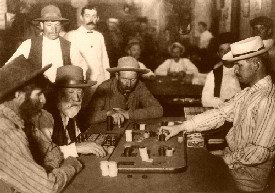
Playing Faro
One trick that Devol liked to play was betting against ministers, who inevitably lost their meager wages to the professional gambler. However, Devol would always return their money, along with this advice: “Go and sin no more.” But to the many soldiers, paymasters, farmers, thieves, and businessmen, he was not so kind.
When the war was over, the railroads began to head west, with settlements sprouting up all along the way. Many of these burgeoning towns, often filled with railroad workers, miners, and cowboys provided all manner of vices, including prostitution , numerous saloons , and the ever-present gambling halls. Supplying perfect opportunities for Devol’s operation, he followed the railroad expansion between Kansas City and Cheyenne in the early 1870s.
According to his account, Devol was working the Gold Room Saloon in Cheyenne when he encountered Wild Bill Hickok . Devol tells the story that when Hickok placed a $50 bet, he lost. He then placed another $50 bet, winning the hand that time; however, the dealer handed him back only $25. When Wild Bill protested, the dealer stated that the house limit was $25. “But you took 50 when I lost,” said Hickok, to which the dealer responded, “Fifty goes when you lose.” The quick-tempered Hickok wasn’t about to accept those terms “sitting down” and quickly whacked the dealer on the head with his walking stick, turned over the table, and stuffed his pockets with the till.
On another occasion, when Devol was working the railroad route, he beat a railroad director out of $1,200. This one-time winning game resulted in Devol’s profession being quickly curbed when the outraged official prohibited gambling on trains. Further, the Pinkerton agency was hired to be on the lookout for the most notorious professional gamblers, including Devol.
In 1892, Devol published his autobiography, Forty Years a Gambler on the Mississippi , telling of his life and probably exaggerating much of it. Shortly after he published his book, the great days of railroad and riverboat gambling were over. At his new wife’s insistence, he retired from gambling for good in 1896 and spent the last years of his life selling his book.
It is estimated that Devol won over two million dollars in his forty years of gambling. However, when he died in Hot Springs , Arkansas , in 1903, he was nearly penniless.
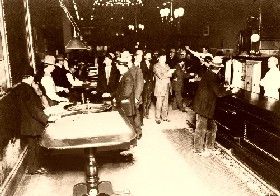
Reno, Nevada Gambling, 1910
© Kathy Weiser-Alexander / Legends of America , updated November 2021.
Old West Poker
Saloons of the Wild West
Scoundrels of the Old West

This Week In Illinois History: Riverboat Gambling Comes To Illinois (Feb. 7, 1991)

Illinoisans have bet on horseracing since 1927, purchased Lottery tickets since 1974 and gambled for non-profit charities since 1986.
But on Feb. 7, 1990, Gov. James Thompson signed the Riverboat Gambling Act , laying odds on economic development and tourism.
With a blackjack table as a desk, the signing ceremony took place at the Peoria Boatworks. A steamboat blasted its whistle while a calliope played “ Happy Days are Here Again .”
The newly created Illinois Gaming Board granted 10 licenses, giving preferential treatment to economically depressed areas outside the Chicago area. Riverboat casinos could operate only on water and gambling was permitted only after the boats left the dock.
The first license went to Alton, which launched Illinois’ first riverboat casino, the Alton Belle, on Sept. 10, 1991. The three-deck, 600-passenger boat held 296 slot machines and 22 gambling tables.
In the first year, riverboat gambling brought in $8 million in tax revenue. The next year, it raked in $54 million, surpassing horseracing revenue.
On May 21, 1999, Gov. George Ryan signed a new Riverboat Gambling Act, which allowed gambling to continue on riverboats while they remained dockside. The new law, however, allowed an easy work-around. Rivers Casino in Des Plaines, for example, dug a shallow pit on dry land, filled it with water, and built a casino over it.
Riverboat gambling tax revenue peaked at $699 million in 2005.
In June 2019, Gov. J.B. Pritzker signed legislation allowing Illinois’ 10 riverboat casinos to move operations to dry land, effectively tapping out this brief and quirky footnote to our state history.


The Intriguing History of Riverboat Casinos
It’s quite interesting to know that the riverboat casinos are seldom moved away from the dock. Many states authorized this type of casino to put some limits on the gambling activities. The law didn’t allow casinos to be operational on land nor did it allow their construction on land areas. Instead, the casinos had the permission to operate on riverboats.
In recent times, riverboat casinos exist in several American states. They’re located along the Gulf Coast or along the Mississippi River. One can also find riverboat casinos along the Mississippi River’s tributaries. If you are suffering from sea-sickness, you can always play online casino. Check out Casinos Jungle , the #1 online casino platform in the US and in Canada.
Paddlewheel riverboats in the 20th century
In the early 20th century, there were paddlewheel riverboats to transport passengers and freight on the Mississippi River. The tributaries of this river also had these boats for transportation. Then came a time when the railroads became popular for transporting freight and passengers. As a result, these riverboats became increasingly useful for excursions that lasted several hours.
Instead of transporting people between riverfront towns, they were more of an escape from the crowds. They began hosting dancing and live music. Soon, they became popular places for gambling with the use of slot machines and card games.
Approval and prohibitions
In the late 20th century, the riverboat casinos got the approval of states. Most of the states had prohibitions in place for gambling activities on land. As these riverboats operated casinos in them, they had to sail away from the dock. At certain places, gambling activities were allowed only when the ship was sailing.
Indiana, Illinois, Louisiana, Missouri, and Mississippi were some of the states that allowed riverboat casinos. The state of Illinois also allowed limited number of casinos in the metropolitan area of Chicago. Most of the states that gave an approval for riverboat casinos have a frontage along the Mississippi River.

River border situation between Maryland and Virginia
During the mid-20th century, a quirk in the state border between Virginia and Maryland led to an unusual situation. The border is on the Virginia side at the low water mark and not in the middle of the river. So, the entire river falls in Maryland except for some small portions.
This led to several riverboat casinos being docked off to the Virginia shores. This happened in the 1950s, when gambling was not legal in Virginia. The visitors had to park in Virginia and walk across a pier, as the river was in Maryland.
Amending of the state constitution
In the year 1994, voters in Missouri gave their approval to amend the state constitution. This was to allow games of chance to continue on the Missouri and Mississippi rivers. Only some part of Missouri’s riverboat gambling industry were clearly on the channel of the main river by 1998. According to the ruling of the state’s supreme court, the boats had to be solely over the surface of the rivers.
These boats were also required to maintain contact with the rivers’ surface. Casinos had to be in a moat on these riverboats. They could also be in a place with water adjacent to a waterway that was navigable. This led to the riverboats being referred to as ‘boats in moats’.
Leave a Reply Cancel reply
Your email address will not be published. Required fields are marked *
Save my name, email, and website in this browser for the next time I comment.

History of Riverboat Gambling on the Mississippi
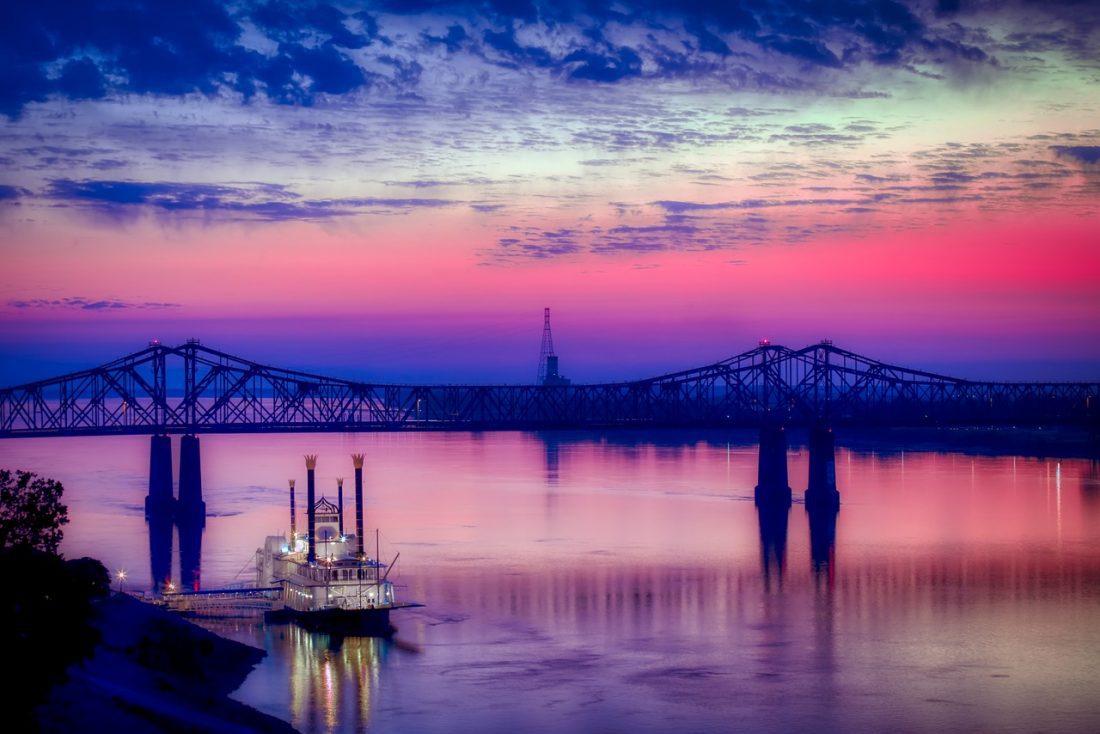
The South has always been at least somewhat friendly to gambling due to the rise of the riverboat in the early 1900s. Games of chance were kept on the water so that anti-gambling laws wouldn’t apply. Games like poker and roulette took place on grand riverboats, even if the ship never left the dock.
This tradition was greatly reduced when the railroad became the main way to transport both goods and people, but some riverboats remain in the South today. In Mississippi and Louisiana, especially, retired steamboats are now used for river cruising and for gambling in places like Vicksburg.
Online casinos are one of the latest innovations in the casino industry. Since the rise of technological advancements, they are solid competitors to U.S.-based land-based casinos. Many gambling restrictions still remain in the South and across the ocean. For example, every casino in the UK gets licensed by the UK Gambling Commission.
The regulations of the U.S. online casino market have led to developers existing who only get associated with U.S. casinos and are not available at UK-based gaming sites. Some famous developers for the U.S. market are RealTime Gaming, Relax Gaming, Rival Gaming, Elk Studios and Betsoft.
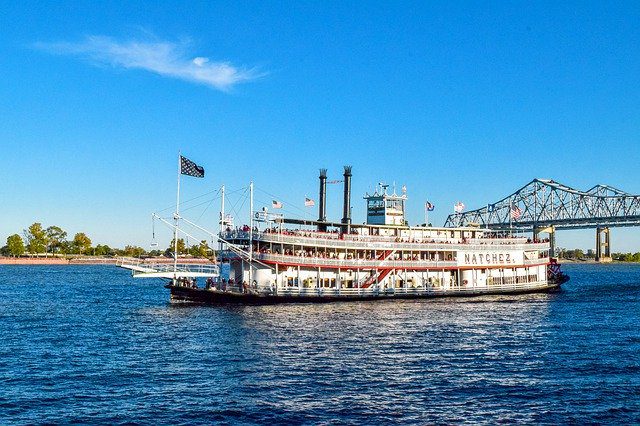
But for those players who want the old-time experience of dressing up and boarding a grand steamboat, the South has plenty for them. Just look along the Mississippi River from Missouri to Louisiana. According to Visit Mississippi , the first steamboat to travel the Mississippi River was the New Orleans, whose October 1811 maiden voyage began in Pittsburgh, Pennsylvania. The New Orleans stopped in Natchez in December 1811 before continuing to its final port in New Orleans.
Wealthy Southerners could afford to travel by steamboat, and some were ornately decorated in the Victorian style. The riverboat casinos that remain today continue that grand tradition, with music playing onboard, restaurants available to players and even live entertainment offered regularly.
So, if you want to step back in time and experience the old South by river—without all the outlaws and pirates —consider a riverboat cruise or evening of gaming.
SHARE THIS STORY:
Eco-conscious travel, the wild history of, related articles.

3 Must-Visit Histori

6 Creative Trips Thr

Best Photo Spots in
No comments, leave a comment cancel reply.
Main Navigation
A History of Riverboats in Mississippi
The mighty Mississippi river stretches from Northern Minnesota to the Gulf of Mexico. The second-longest river in the United States, the Mississippi is integral to the history of America — particularly in the state of Mississippi. Riverboats facilitated travel, commerce, and cultural exchange within Mississippi and beyond. Learn more about the impact of Mississippi riverboats in this post from Visit Mississippi .
Riverboats: The Early Days
While people have navigated the waters of the Mississippi River for centuries, steamboat technology was not viable until the early 1800s. The first steamboat to travel the Mississippi was the New Orleans, whose October 1811 maiden voyage began in Pittsburgh, PA, and ended in New Orleans after traveling along the Ohio and Mississippi Rivers.
The New Orleans stopped in Natchez in December 1811 before continuing to its final port in New Orleans. First established by French colonists and later ruled by the Spanish, Natchez was an important center of trade and cultural exchange.
The Golden Age of the Steamboat
By the 1830s, steamboats existed all along the Mississippi River and its major tributaries. The growth of Mississippi’s riverfront communities, such as Bolivar, Commerce, and Greenville, can largely be attributed to the riverboat trade. Riverboats also brought new settlers to the state, helping to speed up agricultural development in the fertile Mississippi Delta.
Propelled by steam-driven paddle wheels, steamboats could navigate the river more quickly and effectively than barges or flatboats. They carried goods such as cotton, timber, and livestock up and down the river, expanding trade throughout the growing U.S. However, steamboats could be dangerous — the boilers used to create steam could build up too much pressure and explode. Steamboats were also susceptible to hitting obstacles such as rocks or logs, which could cause them to sink. This created a growing industry for a smaller type of riverboat called a “snagboat.” Snagboats patrolled the Mississippi River looking for tree stumps, debris, or other hazards and removing them before they damaged larger steamboats.
Wealthy Mississippians could enjoy leisure travel on a showboat — a riverboat used for theater and musical performances. Showboats were ornately decorated and would announce their arrival at a port by playing music that could be heard for miles.
Riverboats During the Civil War
During the years after Mississippi’s secession from the Union, many steamboats were used to support the Confederate Army. Riverboats carried troops, provisions, and supplies along the Mississippi during the Civil War. Demand for ships was so high that both the Union and Confederate governments chartered steamboats. Riverboats also played a role in the defense of Vicksburg, an important Confederate stronghold that connected the South to the Western states.
Gaming on the River
Riverboat gambling became popular in the early 1900s due to legislation surrounding gaming. By keeping poker, roulette, and other games of chance restricted to a riverboat, business owners could evade the anti-gambling laws that were in effect on land in states along the Mississippi River. Riverboat gaming in Mississippi was legalized in 1993, but unfortunately, Hurricane Katrina destroyed many riverboat casinos. In response, Mississippi lawmakers allowed casinos to move 800 feet inland.
However, you can still find a few riverboat casinos throughout the U.S. In Mississippi, visitors can try their luck at the Ameristar Casino Hotel in Vicksburg , a riverboat-style casino and hotel located right on the water.
Mississippi Riverboats in the Present Day
According to National Geographic, by 1900, the growth of railroads across the U.S. significantly reduced the demand for transporting goods and people via steamboat. Many riverboats were retired, but a few showboats remained as a testament to this period in history.
The popularity of riverboats continues to thrive in the Magnolia State. Today, tourists can enjoy the relaxing and immersive experience of river cruising. These luxury expeditions offer a unique way to travel the Mississippi, where guests can admire the breathtaking scenery along the waterway. First-class accommodations, fine dining, and a variety of things to do can be expected on a luxury tour on the Mississippi. Companies such as American Cruise Line and Viking River Cruises offer a variety of cruises that vary in duration and cities visited, like Vicksburg and Natchez.
Plan Your Trip With Help From Visit Mississippi
If you’re planning a trip to one of our historic riverfront cities like Natchez, Vicksburg, or Greenville — or anywhere else in the Hospitality State — Visit Mississippi is here for assistance.
Plan your next trip to Mississippi using our complimentary trip planner tool that helps you map out all your must-see attractions, restaurants, and lodging options. Whether you’re here for a week or just passing through, you’ll find a wealth of information about Mississippi history and culture on the Visit Mississippi website. For more information, contact us today.
Email Updates
Discover new ways to wander.

Get your free Mississippi official Tour Guide.
- Things to Do
- Places to Stay
- Experiences
- Accessible Travel
- Meetings and Conventions
- Group Travel
- International Travel to Mississippi
- Mississippi Tourism Partners

Copyright ©2024 Mississippi Development Authority All Rights Reserved. Privacy Policy
Privacy Overview
Search by keyword or phrase.
Laissez le Bon Temps Roulette: Letting the Good Times Roll on Riverboat Casinos
Until 1990, casino gambling was legal only in Nevada and Atlantic City, N.J. Since then, it has been authorized in 23 states, including four in the Eighth Federal Reserve District. In a quest to raise revenues without imposing additional taxes on the populace, these states have approved casino gambling, touting that new jobs will be created and additional monies will be made available for education.
Iowa, which was the first Midwestern state to approve riverboat gambling, found it to be quite successful. Illinois, Missouri, Indiana and Mississippi have now followed Iowa's lead and passed riverboat gambling initiatives. The degree of success of these operations varies by state and depends on the concentration of nearby competition. Because gambling is too new in Indiana and Missouri, riverboats in Illinois and Mississippi are the centerpieces for our District. Arkansas, Kentucky and Tennessee have not yet tackled the issue, either in an election or in the legislature.
Illinois' first boat opened in September 1991. During its first week of operation, which was only five days long, 7,130 people attended, and adjusted gross receipts—after payouts for winnings—were about $296,000. Of this total, about $73,500 was paid in state and local taxes: Illinois requires two dollars of the admission fee go to the state and locality (one dollar to each) and imposes a wagering tax—15 percent to the state, 5 percent to the locality—on the adjusted gross receipts.
At the end of 1991, with two riverboats operating, adjusted gross revenues in Illinois were almost $15 million, with more than $3.5 million in taxes going to government agencies. By 1993, Illinois had 10 riverboats, with revenues of almost $606 million. During the first quarter of 1994, 12 riverboats produced revenues of slightly more than $217 million, about $10 million less than receipts for all of 1992, and logged more than four million visitors. If attendance and revenues continue on this path for the remainder of the year, the state can expect to collect wagering taxes of almost $175 million and admissions taxes of about $34 million.
Illinois law does not allow dockside gambling, unless circumstances prevent the boats from cruising, nor does it include a loss-limit—the maximum amount an individual can lose during a gambling excursion. This certainly gives its casinos an advantage over those that are subject to a loss-limit in neighboring states, like Missouri.
Voters approved Missouri's riverboat gambling referendum in November 1992, and plans were immediately hatched to place riverboats in the St. Louis and Kansas City metropolitan areas. Opponents of gambling, however, filed suit, questioning whether games of chance—slot machines, craps, roulette, etc.—were constitutional in the state. The state Supreme Court said no, thereby requiring a constitutional amendment to allow such games on the boats. In April 1994, the amendment failed by the narrowest margin in state history. A recount was requested by the pro-gambling campaign, but the outcome was a wider margin of defeat for the amendment. In response, the state legislature legally redefined games of skill to include craps, video poker and video blackjack. This law is expected to face a court challenge, but, until then, riverboats have opened to offer games of skill.
Missouri imposes admission and wagering taxes similar to Illinois'. The state receives 18 percent and the locality receives 2 percent of adjusted gross revenues; two dollars of the admission fee are turned over to the state gaming commission, which keeps one and gives one to the locality. Also like Illinois, Missouri does not allow dockside gambling. 1 It does, however, impose a loss-limit of $500 per excursion on individuals. This provision superficially appears to handicap Missouri casinos against their counterparts in neighboring states where loss-limits do not exist. The provision's effectiveness is blunted, though, because it applies only to a single excursion: Individuals need only pay an additional admission fee for further excursions to continue playing. What this will mean for revenues remains to be seen, particularly because many of the plans, especially in St. Louis, call for extensive land-based building—for example, hotels—in conjunction with the riverboats, which will raise other revenues for the state.
Casino Gambling in the United States

NOTES: Nevada has about 2,200 gambling establishments in all counties. The three major sites are "pinned" on the map. Alaska and Hawaii currently do not have casino gambling. Tribal reservation information is current through May 2, 1994. Land-based and riverboat casino information is current through June 24, 1994.
SOURCES: Land-based and riverboat casinos: State departments of gaming or state gaming commissions. Tribal reservation casinos: National Indian Gaming Commission.
Indiana enacted its gambling law in July 1993, allowing individual counties and municipalities to ask voters if they want riverboats in their area. Currently, the Indiana Gaming Commission has only five licenses to grant to Ohio River communities; six counties, across the river from Cincinnati and Louisville, have already passed referendums. The first boat is expected to open by the end of this year. As in the other states, Indiana will impose admission and wagering taxes on the casinos. The state retains 15 percent of adjusted gross revenues, and the local and county governments each get 2 ½ percent. Of the $2.50 admission tax, one dollar each goes to each the local and county governments, and 50 cents goes to the state. Unlike Missouri, Indiana does not have a loss-limit provision. As in Illinois and Missouri, dockside gambling is allowed at the boat captain's discretion for safety. This allowance for dockside gambling, though, is still more restrictive than that in other states, for example, Mississippi.
Mississippi
Mississippi's first boat opened in August 1992 in Biloxi. By the end of 1992, five boats had opened, four on the Gulf Coast and one on the Mississippi River in Tunica County. In 1993, another 12 boats opened for business, four of them in Tunica. This year, nine more boats opened by June, three in Tunica. Mississippi is now second to Las Vegas in total square footage of gaming space. By July 1995, the state predicts there will be more than 40 riverboats operating in the state. Tunica County alone has at least five more casinos slated to open this year and has transformed itself from one of the poorest counties in the nation to one of the fastest growing.
Unlike other states, Mississippi allows dockside gambling. Thus, operating costs for the riverboats are dramatically reduced because they do not incur the costs of cruising on the river. Many boats, in fact, do not even have engines or wheelhouses. In addition, Mississippi does not impose a loss-limit on individuals. This has led to Mississippi raising more gambling revenues than any other state except Nevada and New Jersey. For example, in 1993, with 17 boats operating by the end of the year, Mississippi boats' adjusted gross revenues were about $790 million. In Illinois, 10 boats in 1993 had adjusted gross revenues of about $606 million.
Mississippi also has a more complex taxing scheme—it imposes a progressive rather than a flat wagering tax. Essentially, the state collects an increasing percentage of monthly adjusted gross revenues: 4 percent on the first $50,000, 6 percent on the next $84,000, and 8 percent on anything above $134,000. Local taxes follow the same scheme with much lower rates, and individual counties and cities make different provisions.
Much of this fanfare may cool because of the riverboat casinos in Louisiana, especially those in the New Orleans area. On top of this, a land-based casino, which is a greater revenue generator than a riverboat, will soon open in New Orleans. Direct competition with these facilities, however, will affect the Gulf Coast boats before it reaches those up north. New Orleans' greater ability to attract visitors because of convention and sporting facilities, as well as the city's well-known appeal as a tourist destination, will hurt Mississippi, but the extent of the effect remains to be seen. Until then, Mississippi has a head start and the experience its competition does not.
Thomas A. Pollmann provided research assistance.
- There is one exception in St. Louis for a boat that does not move under its own power. [ back to text ]
Related Topics
Views expressed in Regional Economist are not necessarily those of the St. Louis Fed or Federal Reserve System.
For the latest insights from our economists and other St. Louis Fed experts, visit On the Economy and subscribe .
Media questions

NorthIowaToday.com
Founded in 2010
News & Entertainment for Mason City, Clear Lake & the Entire North Iowa Region

Subscribe to NIT
Website design for businesses: breakthrough web design, the history of riverboat gambling.
- Published on July 6, 2023
- by NIT Publisher
This article will discuss the history of riverboat gambling, beginning in the 1800s. We shall also look at some of the best riverboat casinos in the USA, including Iowa, Mississippi and Louisiana.
Of course, only some people are interested in riverboat casinos. If they are not your thing, try a top-notch online casino like FruityKing.co.nz that offers a full range of exciting casino and pokies games, all from the comfort of your home.
A Brief History of Gambling on Riverboats
The Mississippi was the lifeblood of American industry in the 1800s, with traders taking full advantage of the connections available when using the river for transporting goods.
This method of transportation was useful, but it was also long and tedious. The merchants and passengers would gamble for entertainment and excitement to pass the time and keep themselves entertained.
Very soon, professional gamblers were enticed to the riverboats, especially those with a reason to keep a low profile! As it was, gambling was illegal onshore, which meant the river boats were a means of gambling without breaking the law directly.
The Mississippi River borders more than one state, leading to the riverboats gaining popularity as entertainment destinations where people would come to dance, listen to live music and gamble.
The latter end of the 19th century saw a decline in the popularity of riverboat casinos, mainly due to the American Civil War and the advancement of the railroad industry.
Early in the 20th century, several states withdrew their hardline stance on riverboat gambling with the first ‘legitimate’ venue, ‘ the City of Traverse’, launched on Lake Michigan.
A Timeline of Riverboat Gambling Regulation
- In 1951, Lyndon Johnson drafted the Transportation of Gambling Devices Act. The Act effectively made it illegal to transport gambling devices across state lines (unless legal in the next state).
- In the late 1980s, the re-emergence of riverboat gambling appeared. Several states then introduced laws allowing gambling on water vessels. Iowa was the first state to legalise riverboat gambling (1989).
- Today, you can find riverboat gambling in Iowa, Illinois, Mississippi, Louisiana, Missouri, and Indiana.
- By 2010 there were 17 riverboat casinos. By 2018 this number increased to 63 riverboat casinos, with their popularity showing no sign of slowing.
- The state’s revenue through riverboat gambling varies from state to state, as each state has a different tax percentage on winnings.
Three Riverboat Casino Experiences
Mississippi – The Ameristar Casino promises a fully immersive 19th-century traditional paddleboat experience. The riverboat casino is a highly popular hotel with a large poker room, restaurant, and cafe. Slot machines and sports betting kiosks.
Iowa – Casino Queen Marquette provides its visitors with an exceptional experience. With a ton of floor space, this riverboat offers more than 570 slot machines and table games. Found in the heart of Marquette, Iowa, it’s a favourite venue for locals and visitors alike.
Louisiana – The Treasure Chest Casino – is in the middle of the cultural capital of Louisiana, the famous New Orleans. Offering players a wonderful gaming experience alongside the majestic Lake Pontchartrain.
The Treasure Chest Casino provides a wide selection of table games and slot machines and hosts events.
Share this:
Even more news:.
- Protected: Couple arrested at Northern Iowa hospital after brawl over car seat
- Protected: Brutal stabbing of roommate lands Mason City man in prison
- Protected: Dougherty woman claims innocence after alleged drunk van voyage through farm field near Rockwell
- Protected: Charles City woman evades indecent exposure rap, faces felony after new disturbance
- Protected: Florida man racing through Northern Iowa busted with a pound of meth
- Protected: Northern Iowa sex offender nabbed in attempt to romance teen at hotel
- OBIT: Eugene A. Elsbecker
- OBIT: Robert Reed Bunn
- OBIT: Christopher John Haugerud
- OBIT: Beverly J. Patterson
- OBIT: Bruce Pieper
- OBIT: Recca M. Hejlik
- United States says elections in Syria will be a sham
- At least two North Iowans on Friday flight from Fort Dodge die in Indiana airplane crash
- “Very first rioter to enter the U.S. Capitol building on Jan. 6” sent to prison for 53 months
- Iran-backed Houti terrorists bomb oil tankers, “major environmental disaster” possible
- Northern Iowa dad arrested for trying to visit his kids at school
- Mason City police nab man after violent incident at apartment
- White man robs Iowa bank, flees with cash
- Armed Northern Iowa drug user sent to prison for waving gun at neighbor
- College Football: UNI Panthers handed first loss of the 2024 season at Nebraska, 34-3
- College Volleyball: Iowa Hawkeyes down Illinois State, 3-1
- UNI volleyball comes up short in loss at No. 4 Louisville
- College Volleyball: Iowa Hawkeyes drop four-set match to St. Thomas
- Iowa Ag Secretary Naig announces availability of crop insurance discount program
- Cerro Gordo County Courthouse: Expense report and Supervisor meeting minutes September 9, 2024
- Kim Reynolds travels to India for “trade mission”
- Winnebago County Courthouse: Supervisor meeting minutes and expense report for September 3, 2024
- Worth County Courthouse: Supervisor meeting minutes and expense report for September 9, 2024
- The Benefits of Security Features When Using Crypto in Casinos: Safeguarding Your Digital Assets
- A Quick Review Of GMO Cannabis Strain
- Sell Your Property Quickly and Easily With These 6 Tips
- How to Choose the Right Lawyer For Your Car Accident
- Various Whistleblower Cases: Legal Tips to Help You Understand Them
- What Are the Things That Pedestrians Need to Be Cautious Of
- Chill Out: Your Ultimate Guide to Road Tripping in Winter
- 6 Interesting Life Situations When You Need to Hire a Lawyer
- How to Find High-quality HVAC Solutions: A Comprehensive Guide
- Ways to Build Your Cannabis Career with Expert-provided Knowledge
- Two people hurt in rural Kossuth county house explosion
- Northern Iowa man seriously hurt when ejected from pickup truck
- Iowa schools faced threats this week
- Mason City Fire Department celebrates career of retiring Deputy Chief Carl Ginapp
- Daniel O’Donnell to perform at NIACC Auditorium on Monday, September 16
- Two dead in Northern Iowa head-on auto crash
- 4-year-old Iowa boy dies from accidental gunshot
Previous Stories

Recent Comments
| WikiWaka on |
- September 2024
- August 2024
- February 2024
- January 2024
- December 2023
- November 2023
- October 2023
- September 2023
- August 2023
- February 2023
- January 2023
- December 2022
- November 2022
- October 2022
- September 2022
- August 2022
- February 2022
- January 2022
- December 2021
- November 2021
- October 2021
- September 2021
- August 2021
- February 2021
- January 2021
- December 2020
- November 2020
- October 2020
- September 2020
- August 2020
- February 2020
- January 2020
- December 2019
- November 2019
- October 2019
- September 2019
- August 2019
- February 2019
- January 2019
- December 2018
- November 2018
- October 2018
- September 2018
- August 2018
- February 2018
- January 2018
- December 2017
- November 2017
- October 2017
- September 2017
- August 2017
- February 2017
- January 2017
- December 2016
- November 2016
- October 2016
- September 2016
- August 2016
- February 2016
- January 2016
- December 2015
- November 2015
- October 2015
- September 2015
- August 2015
- February 2015
- January 2015
- December 2014
- November 2014
- October 2014
- September 2014
- August 2014
- February 2014
- January 2014
- December 2013
- November 2013
- October 2013
- September 2013
- August 2013
- February 2013
- January 2013
- December 2012
- November 2012
- October 2012
- September 2012
- August 2012
- February 2012
- January 2012
- December 2011
- November 2011
- October 2011
- September 2011
- August 2011
- February 2011
- January 2011
- December 2010
- November 2010
- October 2010
- September 2010


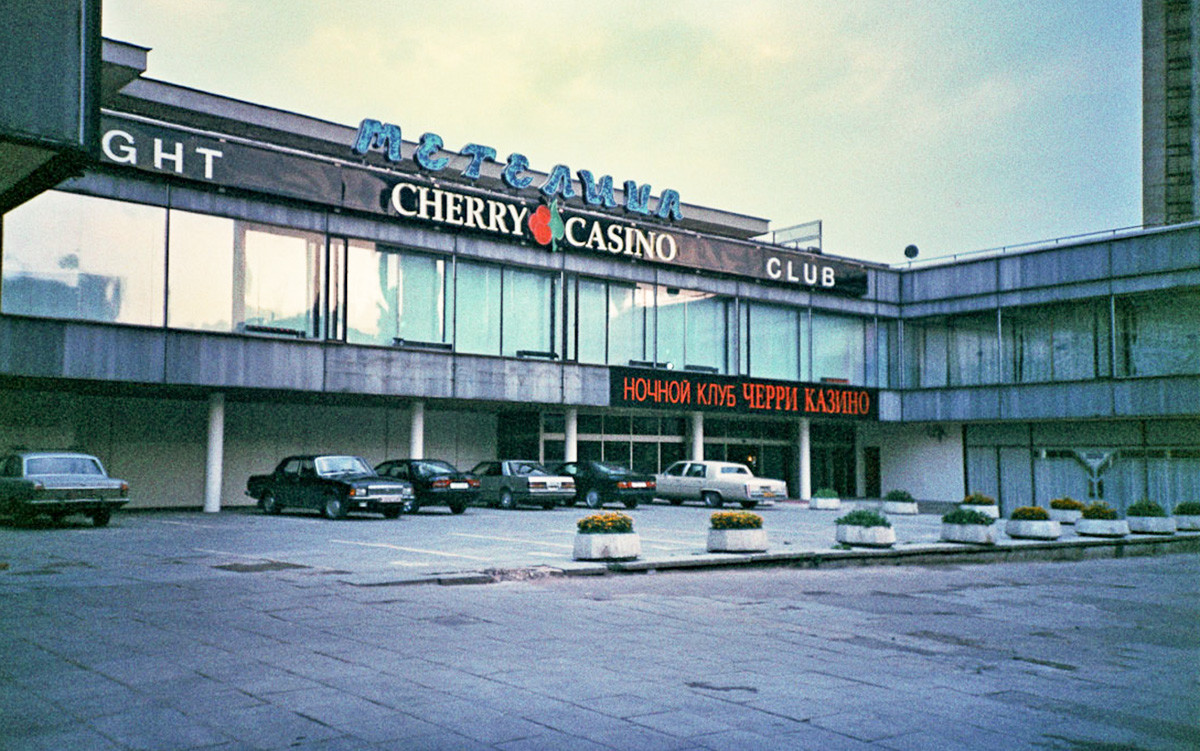

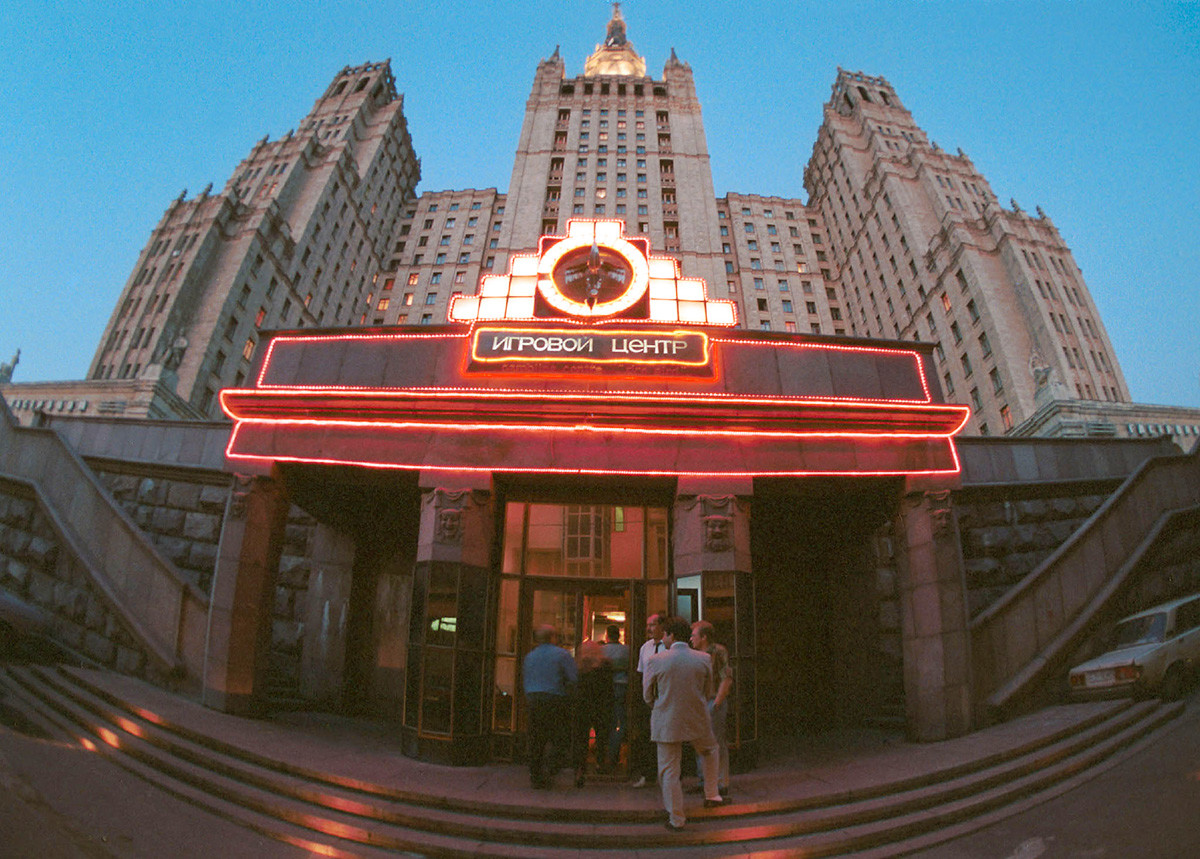



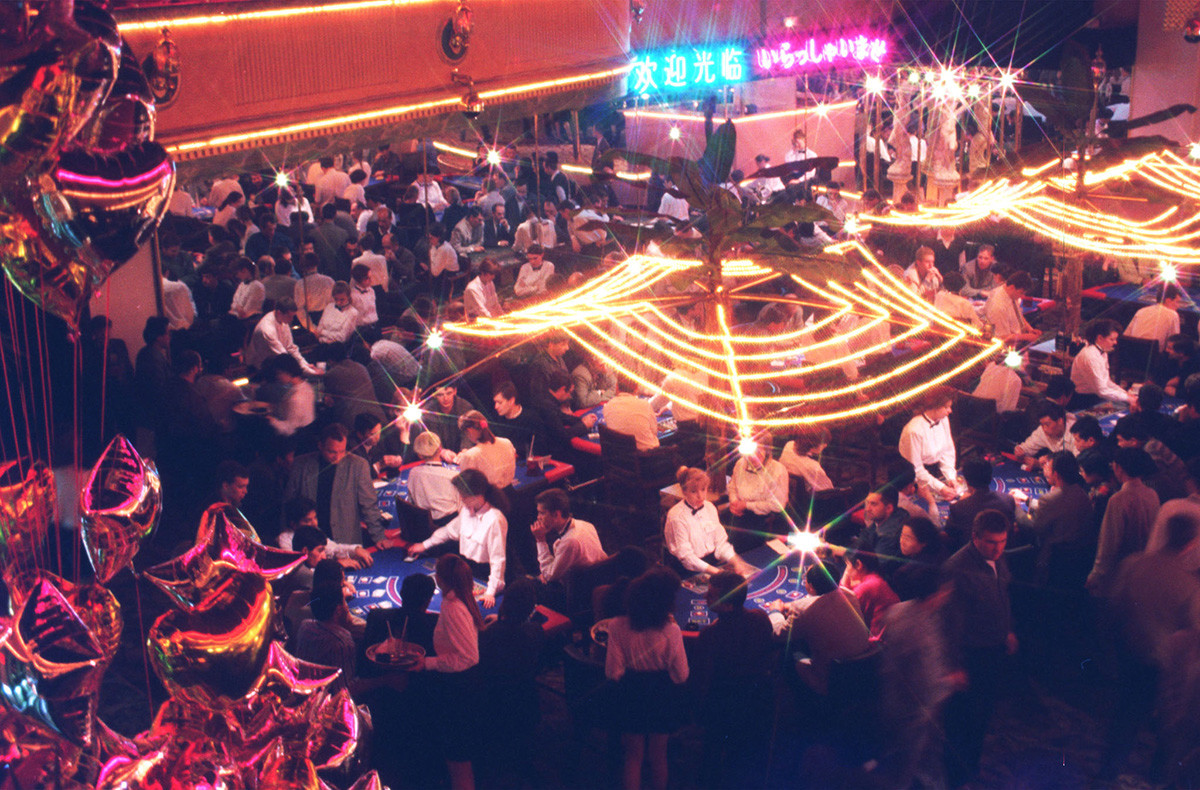
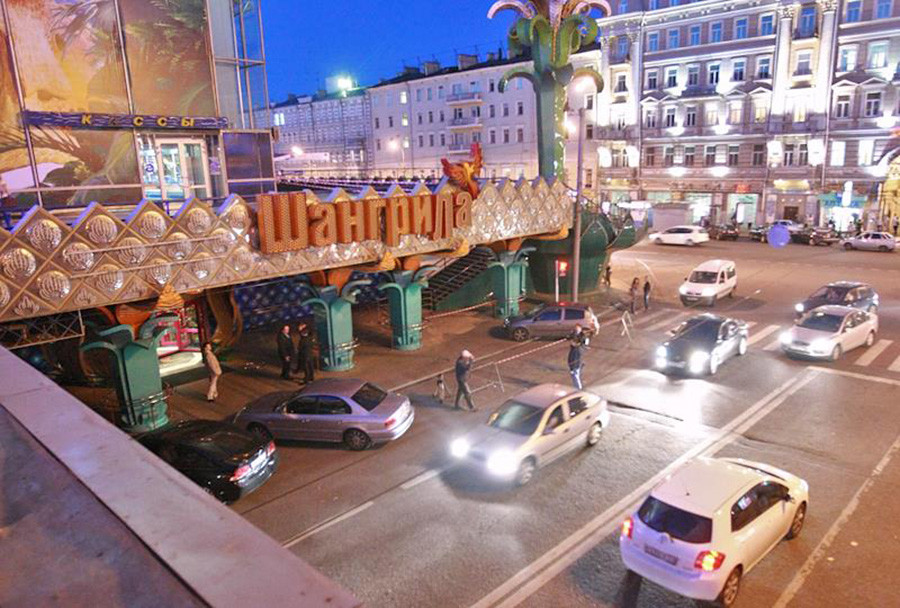
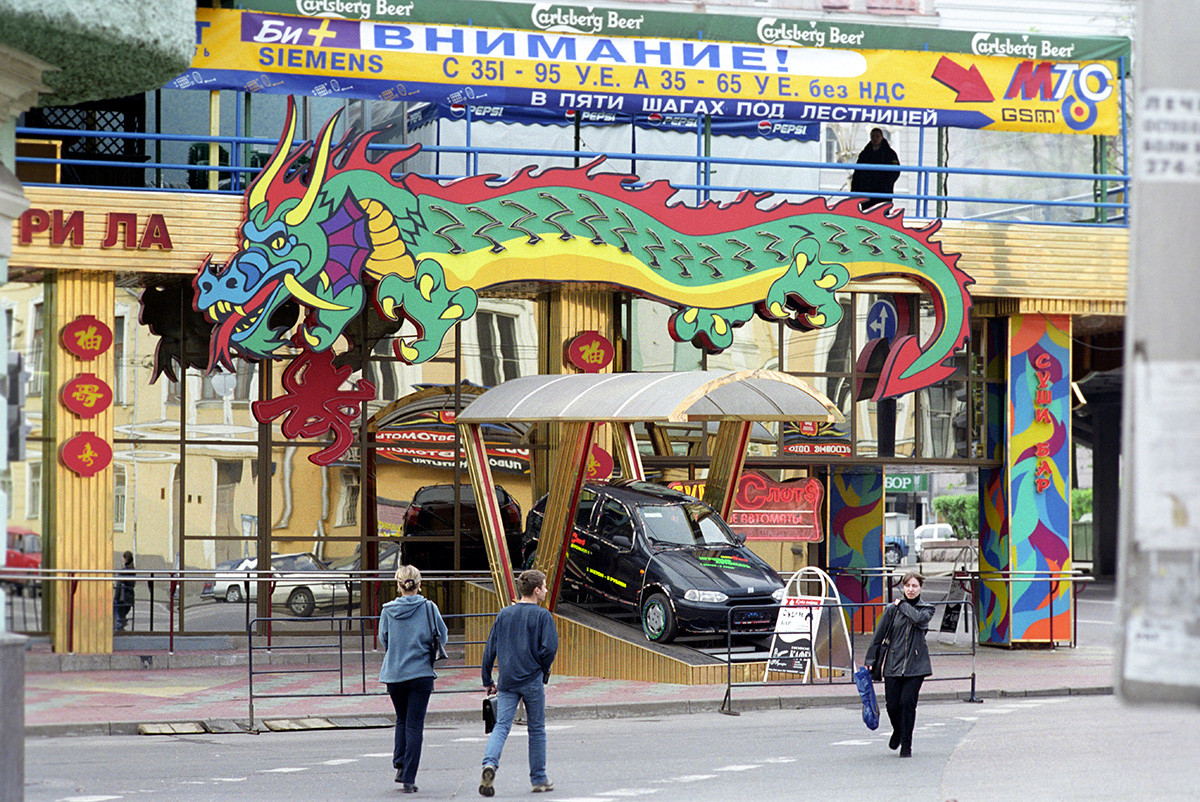


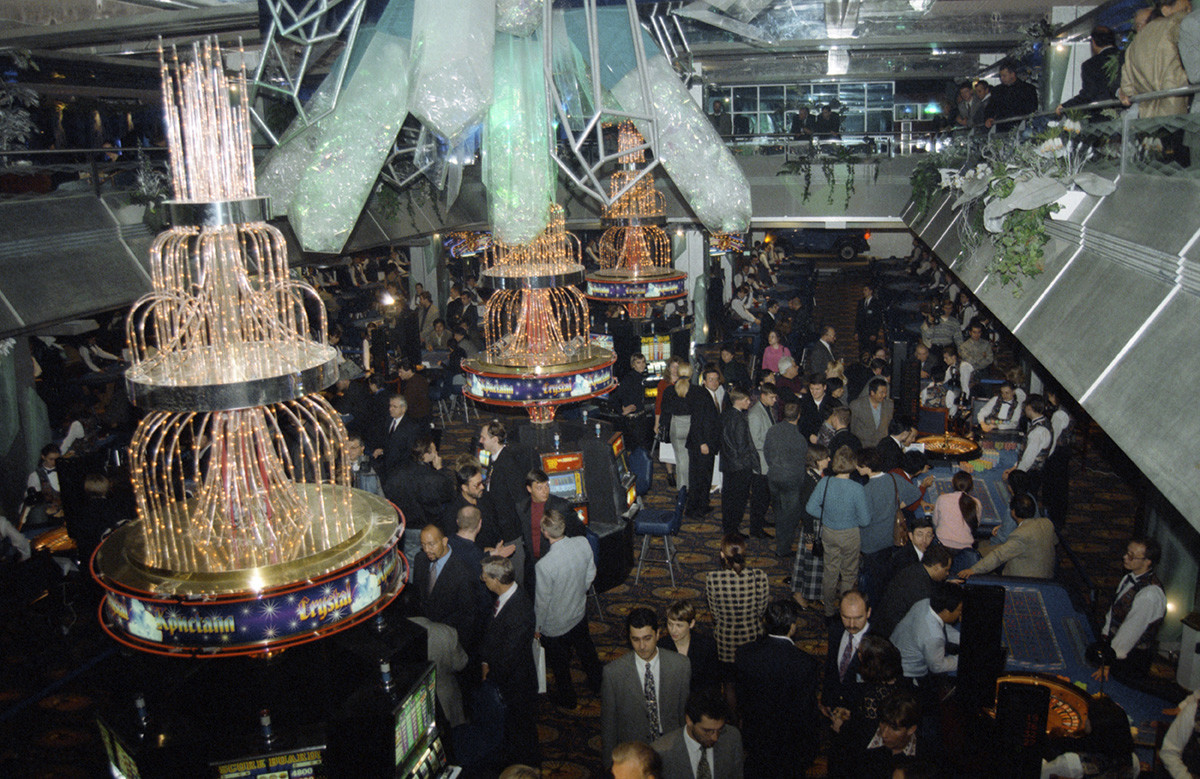
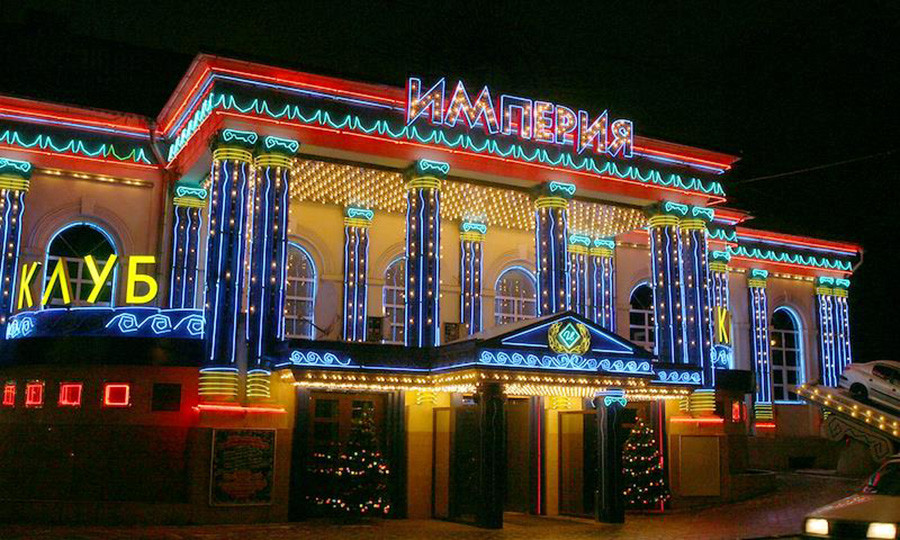
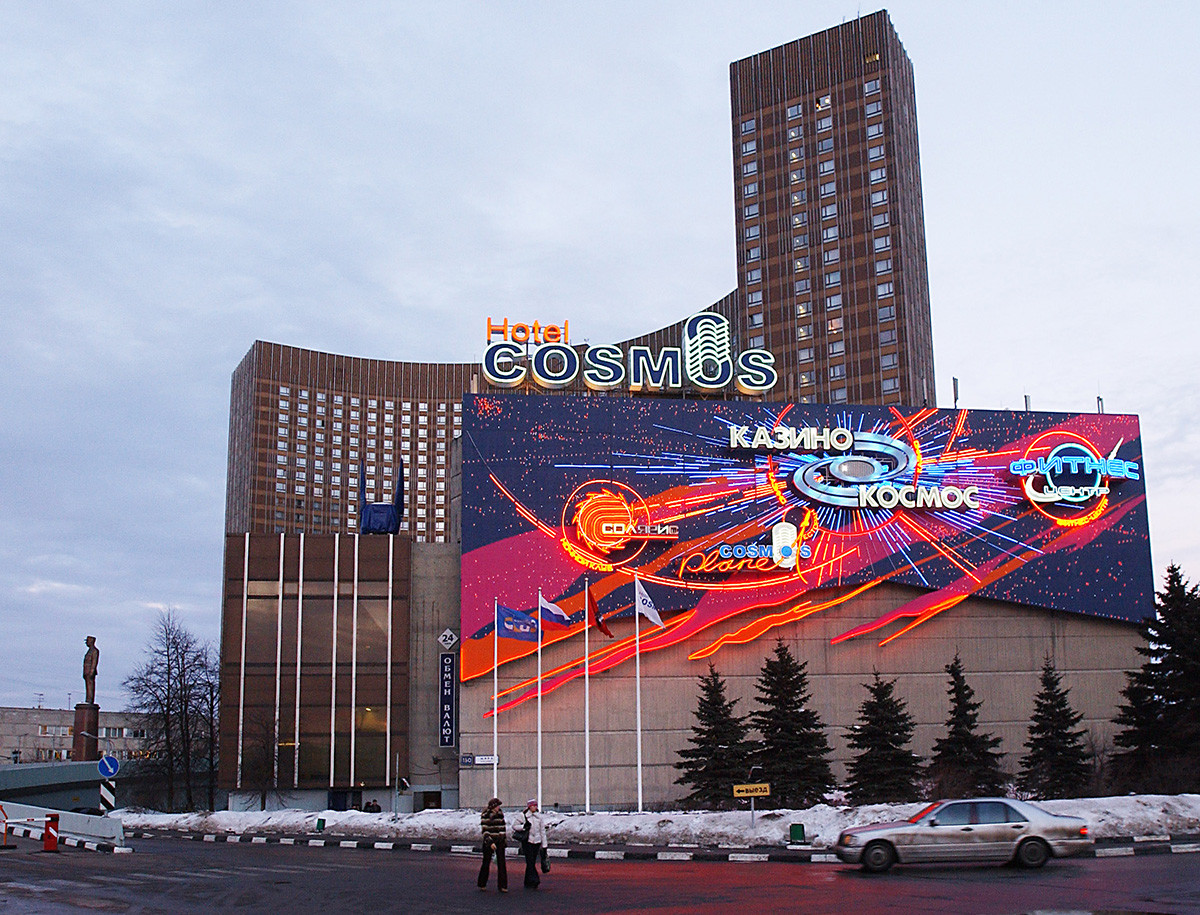
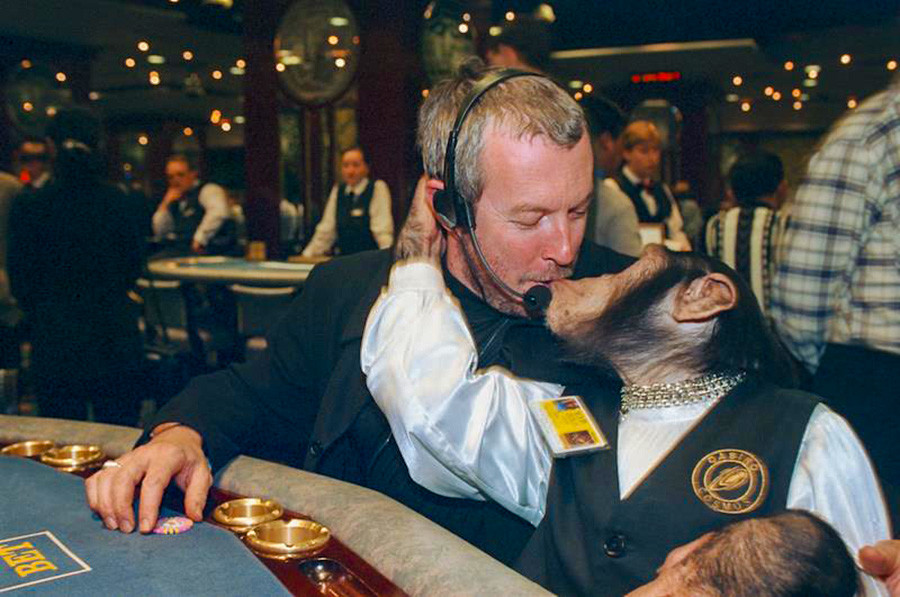



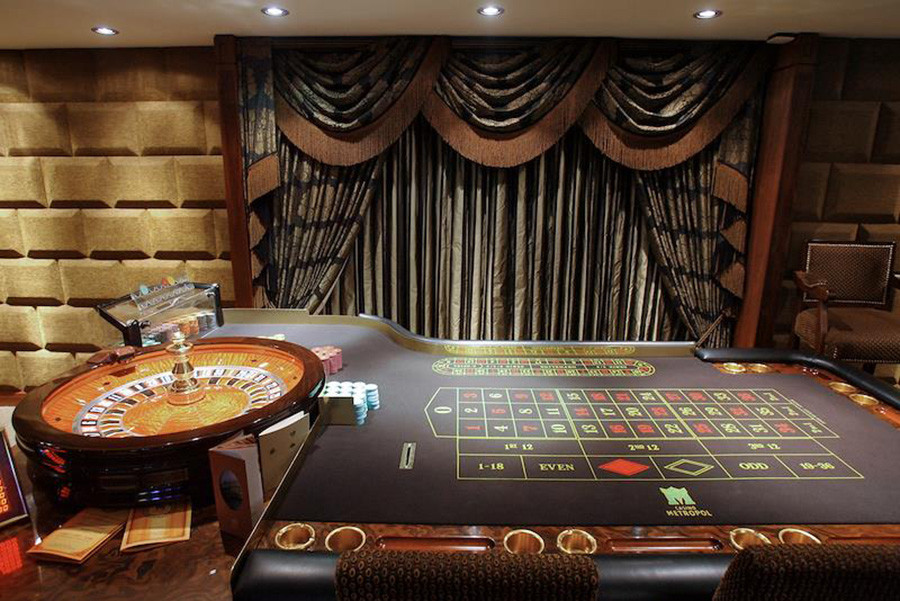
COMMENTS
A riverboat casino is a type of casino on a riverboat found in several states in the United States with frontage on the Mississippi River and its tributaries, or along the Gulf Coast. Several states authorized this type of casino in order to enable gambling but limit the areas where casinos could be constructed; it was a type of legal fiction ...
Explore the fascinating history of riverboat gambling, from its iconic days as American folklore to its modern-day renaissance as riverboat gaming.
Explore the history of riverboat casinos in the United States, tracing their origins, development, and impact on both the gambling industry and American culture.
The first one to become a fully recognised legal riverboat casino was in Iowa in 1989. This state, which lies above Missouri, sits on the network of rivers where riverboat gambling was popular in the 19th century. Other states which were also once smitten with riverboats, such as Louisiana and Illinois, jumped on the bandwagon and passed the ...
George H. Devol was the greatest riverboat gambler in the history of the Mississippi River, as well as a con artist, a fighter, and master at manipulation.
Riverboat casinos, particularly in places like Illinois and Louisiana, among a few others, became a hotbed for gambling activity and skirted traditional laws. Let's take a closer look at the history of riverboat gambling in the United States.
Riverboat casinos are a popular form of entertainment all along the Mississippi River and its tributaries. As this mighty river flows across many different state lines, you can find these historic paddleboat gaming hubs in Illinois, Iowa, Louisiana and Mississippi. Despite the rise of online casino games and futuristic high-end land-based casino resorts, this piece of gambling history has ...
A week after running our first story on the Diamond Lady, the rough sketch of the historic riverboat casino's history can now be fleshed out, thanks to
Of course, modern riverboat casinos have been popular since the early 1990s. Iowa was the first state to legalize riverboat gambling, with several states bordering the Mississippi river like Mississippi, Missouri, Illinois, Indiana, and Louisiana jumping on the bandwagon shortly after.
In June 2019, Gov. J.B. Pritzker signed legislation allowing Illinois' 10 riverboat casinos to move operations to dry land, effectively tapping out this brief and quirky footnote to our state history.
In the late 20th century, the riverboat casinos got the approval of states. Most of the states had prohibitions in place for gambling activities on land. As these riverboats operated casinos in them, they had to sail away from the dock. At certain places, gambling activities were allowed only when the ship was sailing.
History of Riverboat Gambling on the Mississippi. The South has always been at least somewhat friendly to gambling due to the rise of the riverboat in the early 1900s. Games of chance were kept on the water so that anti-gambling laws wouldn't apply. Games like poker and roulette took place on grand riverboats, even if the ship never left the ...
Riverboat gambling became popular in the early 1900s due to legislation surrounding gaming. By keeping poker, roulette, and other games of chance restricted to a riverboat, business owners could evade the anti-gambling laws that were in effect on land in states along the Mississippi River. Riverboat gaming in Mississippi was legalized in 1993 ...
Letting the Good Times Roll on Riverboat Casinos. July 01, 1994. By Adam M Zaretsky. Until 1990, casino gambling was legal only in Nevada and Atlantic City, N.J. Since then, it has been authorized in 23 states, including four in the Eighth Federal Reserve District. In a quest to raise revenues without imposing additional taxes on the populace ...
The riverboat casinos employed about 13,000 people in 2018, according to the latest annual report from the Louisiana Gaming Control Board.
Pages in category "Riverboat casinos" The following 41 pages are in this category, out of 41 total. This list may not reflect recent changes . Riverboat casino
A Timeline of Riverboat Gambling Regulation. In 1951, Lyndon Johnson drafted the Transportation of Gambling Devices Act. The Act effectively made it illegal to transport gambling devices across state lines (unless legal in the next state). In the late 1980s, the re-emergence of riverboat gambling appeared. Several states then introduced laws ...
Harrah's Metropolis is a riverboat casino located on the Ohio River in Metropolis, Illinois. It opened in 1993 as Players Island, a joint venture between Players International and show business impresario Merv Griffin as one of the state's first casinos.
As we crossed the Kamennyi (Great Stone) Bridge, and the great, heaping ice slabs of the Moskva River slid beneath us, Roberta resumed the history lesson.
Harrah's Joliet is a riverboat casino in Joliet, Illinois, outside Chicago, operated by Caesars Entertainment. It has 1,138 slot machines, 204 hotel rooms, and 4 restaurants.
Casinos popped up like mushrooms after the rain and quickly attracted people of wealth and power. 1. Metelitsa. Ruslan Krivobok/Sputnik. This casino opened on New Arbat Street in June 1993 and ...
Moscow - Capital, Kremlin, Tsars: The first documentary reference to Moscow is found in the early monastic chronicles under the year 1147, when on April 4 Yury Vladimirovich Dolgoruky (see Dolgoruky family), prince of Suzdal, was host at a "great banquet" for his ally the prince of Novgorod-Seversky "in Moscow." This is the traditional date of Moscow's founding, although ...
In 2009, gambling was banned almost everywhere in Russia. The only exceptions are four specific arranged zones, namely "Altai Palace" in the Altai Republic, "Sobranie" in Kaliningrad, "Casino Sochi" in Krasnaya Polyana near Sochi and "Shambala" and "Tigre de Cristal" in Artyom near Vladivostok. The Azov City gambling complex in Krasnodar was ...